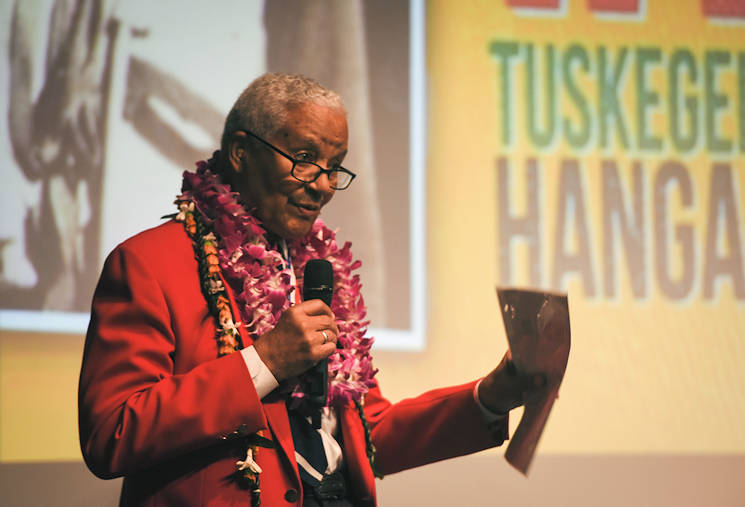|
Imagine going into war abroad coming under a hail of enemy fire to fight
against fascism in Europe and returning home to battle for your own democratic
freedoms. This was the reality for Col. Charles McGee and other minorities
during World War II. In 1942 McGee joined the Army and signed up for a pilot
slot in an experimental program located at Tuskegee Army Airfield, which allowed
African-Americans to train to become airmen for the first time in U.S. history.
|

February 3, 2017 - Retired U.S. Air Force Col. Charles McGee stands
in the Pacific Aviation Museum, Ford Island, Hawaii. McGee, a
Tuskegee Airman, who served as a pilot during World War II, the
Korean War and Vietnam War, gave a presentation at the Pacific
Aviation Museum geared towards youth entitled, “In His Own Words.”
(Department of Defense photo by U.S. Navy Petty Officer 2nd Class
Aiyana S. Paschal)
|
“Well, at the time I hadn’t thought about it like oh we’ll go down Tuskegee
and set the world on fire. It was just a matter of being able to participate and
certainly, for me, it was a joy to be on the flying side of things,” said McGee.
I enjoyed doing that and that’s what I’d like to pass on. I think it’s every
citizen’s right and certainly a responsibility to serve the country in one way
or another, and I think going forward that helps preserve the freedoms we so
much enjoy.” Prior to World War II minorities were only allowed to perform
service type jobs. McGee recalls a 1925 Army War College Report titled “The Use
of Negro Manpower in War”, which made assumptions about African Americans
capacity to serve in the military. ‘The Negro is by nature subservient and
believes himself to be inferior to the white man. He is most susceptible to the
influence of crowd psychology,” said McGee. ‘He cannot control himself in the
face of danger to the extent the white man can. He has not the initiative and
resourcefulness of the white man. He is mentally inferior to the white man’,
McGee said. “This report said because of physical qualification and of course
that meant service you know dig ditches, cook food, drive trucks, but doing
anything technical impossible.” McGee Graduated flight school on June 30,
1943, and was assigned to an all-black squadron called 332nd Fighter Group in
Naples, Italy. Although the men and women of the squadron landed their shot at
serving as airmen, they were still segregated from their white counterparts and
as McGee described “treated like second-class citizens”. “Well, the challenge
pretty much at the time was being accepted based on our ability and so on rather
than the fact that there were those who felt we didn’t have the brain power or
the fortitude to participate in a successful way,” said McGee However, McGee
and his unit quickly gained notoriety through their successful long-range bomber
escort missions. Their flawless execution of their mission earned them the
respect from the white bomber crews and made them a formidable adversary to the
German Luftwaffe pilots. By the end of 1944, McGee had 137 combat missions under
his belt. “Fortunately once given the opportunity we were able to disprove
that because it’s all about first, having an education and developing a talent
and found out we could perform successfully,” said McGee. Charles McGee and
the 332nd’s commitment to service did not go unnoticed by the nation. In 1947
the Army Air Corps started abandoning its policies that promoted segregation.
One year later President Harry Truman signed an executive order to abolish
racial discrimination in the United States Armed Forces. “Well, I didn’t
realize that was happening when I got the opportunity to serve but realized what
it meant because the experience gave the air force the background to make a
decision that affected all of our services and affected the country,” said
McGee. I was just glad to serve and doubly glad that it turned out to be that
important even though that wasn’t a goal for my reason of serving at the time.”
McGee is committed to passing down the first-hand experience of history to
future generations so that they may never forget the lessons learned. “I
enjoy talking to students and enjoy getting their questions and answers because
I realize the value of the lessons that sustained us if you will through those
periods that we don’t want to be repeated in many ways are still important for
their growing up and taking part in the future of our country,” said McGee. So
it’s always a pleasure to talk to students and hopefully get them to realize
that they are the future of their country and so their attitudes are all very
important.” As a result of Charles McGee and other trailblazers like him,
more than one million African-Americans served in World War II. He has a total
of 409 aerial combat missions flown, which is the highest Air Force record.
Today, the United States Armed Forces continues to strive for diversity by
opening opportunities for more citizens to serve.
By U.S. Navy Petty Officer 2nd Class Jerome Johnson
Defense Media Activity
Provided
through DVIDS
Copyright 2017
Comment on this article |



